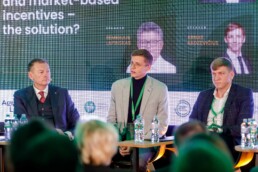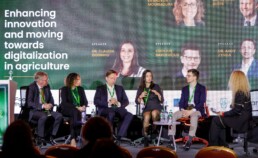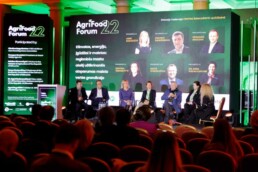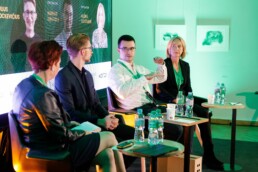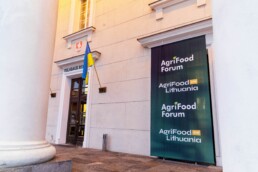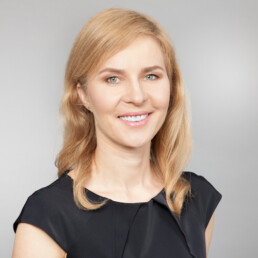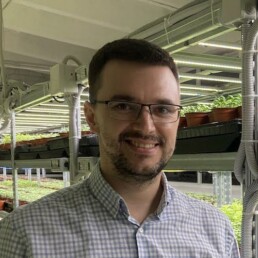AgriFood Forum 2022: Carbon farming and market-based incentives – the solution?
With carbon farming, agriculture takes a holistic approach to address climate change, among the top climate-change culprits. Essentially, the goal is to remove excess carbon from the atmosphere, where it causes global warming, and store it in the soil, where it aids plant growth. In principle, it's pretty straightforward - in practice, it's a bit more complicated.
This topic was brought together and discussed at a high level at the AgriFood Forum 2022. During the discussion, we heard some insights from representatives of businesses and the government.
Since the topic of carbon farming is closely related to farmers, the moderator of the discussion - Živilė Kropaitė-Basiulė, started the discussion with a question for Raimundas Juknevičius, Chairman of Lithuanian Farmers’ Union about how we can define carbon farming.
“When we refer to carbon on the market, we have the green policy of the EU which aims to cut carbon emissions by 2050 and to make it climate-neutral. But it doesn’t mean that we will not have CO2 emissions at all. It means that we will have lower CO2 emissions and will be able to compensate for them. We also have to be able to evaluate whether those measures are effective or not, because the idea is physically related to the issue of our climate change, biodiversity.” - Raimundas Juknevičius.
The second aspect of carbon farming improvement was the financing of farmers. One of the examples that Raimundas Juknevičius presented was a farmer who wanted to make his entire farm green. The more he realized the importance of funding, the more difficult it became to make his idea a reality. The participant of the discussion openly stated that regulations are lacking in the European Union. According to him, there are only two systems, where you need to be recognized and certified before you can play. The importance of having a clear measurement system cannot be overstated, for the purpose of educating and consulting farmers.
No carrot – no motivation
A carbon credit is a permit that allows the owner to emit a certain amount of carbon dioxide or other greenhouse gases. For each credit, one ton of carbon dioxide or equivalent greenhouse gases is allowed to be emitted. Polluting companies receive credits that enable them to continue polluting up to a certain limit, which is periodically lowered. As a result, the company may sell any credits that are not needed to another company that needs them. Thus, private companies are doubly motivated to reduce greenhouse gas emissions. Spending money on extra credits if their emissions exceed the limit is the first step. They can also make money by reducing their emissions and selling their excess allowances.
Talking about these carbon credits Vidmantas Janulevičius, President of the Lithuanian Confederation of Industrialists, has mentioned that in 2014-2015 one tone of CO2 cost 3 euros, and now it is 75 euros, and it was 98 euros a few months ago. This is a specific unit of measure, and all renewable programs are financed by this mechanism.
“We don’t have carbon credits, we were talking about Emission allowances, emissions trading systems. Credits would be granted in advance. Some manufacturers already reached the ceiling and they will definitely need carbon credits. If there is no carrot there is no motivation for the actions. We should have a system where we can reward farmers,” - said Vidmantas Janulevičius.
In addition to his words Arnas Radzevičius, Head of Agro Precision Technology Division at Agrokoncernas, underlined that our system lacks maturity as well. According to him, it is vital to support ideas and solutions that can offer different levels of carbon locking in farms or carbon capture.
CEO at Dojus Group, Donatas Dailidė suggested that carbon credits have to be bought and used locally. Another thing that he talked about is the measures on a free market where you are paid for carbon in advance. “If a farmer undertakes to implement a program, part of the credit is bought and sold to the markets. Right now, the market is being developed, and a lot of infrastructural products are being created to assess credits and so on. The banks are setting up a special department. What we need is regulations and clear rules. Then everyone would feel safer on the market and the value of a credit would increase.”
The director at Green Policy Institute, Remigijus Lapinskas has indicated that voluntary carbon farming is at the beginning stages not only in Lithuania but also elsewhere. As an industry will soon be forced to spend a huge amount of money for the search and acquisition of those credits, if by that time we will not be able to establish the system we may end up in the situation we had with waste money and packaging management a few years ago. Lithuania did not establish a proper system and did not control it sufficiently.
As of contribution with the Green Policy institute, Vidmantas Janulevičius talked about their joint contribution to the system. The need for educating people will be the priority. He said that it is important to read the documents that are being drafted and we have to see, plan, and forecast the future five years ahead. Otherwise, the situation will be stuck.
Agrifood Forum 2022: Digitalization as an instrument to make our food system more sustainable
“Enhancing innovation and moving towards digitalization in agriculture” – this is what one of the panels of the AgriFood forum focused on. The panel discussion was kicked off by Dr. George Beers, the coordinator of SmartAgriHubs, Wageningen University & Research, who gave a fascinating presentation on innovation and digitalization in agriculture.
He started his speech with three dimensions of sustainability. These dimensions - environmental, social, and economic - must be considered when discussing sustainable food production. They usually determine our promises to improve, reduce, eradicate, or create certain things.
To understand the current state of digital innovation in agriculture, they have conducted a short survey among 11 Horizon projects. In some cases, data shows weak positions that deserve attention, while in others, the situation is far more promising.
“Is this a negative thing? I don’t think so. We have to be aware, that these are responses from Horizon projects’ researchers. So, they always look for the problems,” - George Beers ironically pointed out saying that researchers are defining the challenges they need to work to address a bit more. “I am quite positive about this since it helps me to identify where to put more emphasis to make the promises come true. Also, we shouldn’t forget some dimensions that are important for society or for farmers or for sustainable food. We don’t forget them. This is the message behind all of this,”- continued George Beers.
In his view, digital innovation hubs perform the role of one-stop shops for stakeholders locally. There are 350 existing DIH networks in Europe, including SMEs, start-ups, and scale-ups, 1000 organizations, 3500+ users, and 60+ innovation hubs. All of these hubs are connected to an innovation portal that collects all the knowledge, good practices, experience, and tools and makes them available to DIHs so that they can use them in their local communities.
Dr. George Beers finished his speech with a motivating note: “I think that if we want to make the next steps in the digitalization in the Agrifood, we need to have more focus on the impact and don’t forget the promises that we made. We need to have more insight and more effort into creating evidence...We should continue to connect the dots so that we can build upon each other’s results instead of doing the same all over Europe and reinventing the wheel over and over.”
Enhancing innovation and moving towards digitalization in agriculture
Claudia Godinho from the Portuguese EIT FOOD Hub addressed the topic of digitalization in the agrifood sector. She revealed that 78% of water is used in agriculture in Portugal in excess of Europe's average. In her opinion, it is possible to improve the situation in Europe as a whole as well. However, this highlights the need for digitalization. We are already taking steps to change the situation on a global scale.
Evangelia Mourmoura, team leader of DG Agriculture and Rural Development at the European Commission, said: “the digital transformation of Agriculture is happening. It is shaping right now and it is one of our core important points under the common agricultural policy that starts shortly, in 2023. We see it in digitalization and Innovation as a crosscutting objective. It is a horizontal objective that needs a comprehensive approach and systems so we boost the digitalization uptake targeted on specific needs.”
Andy Zynga: EIT Food transforms the food system in Europe to make it more tangible
CEO at EIT Food - Andy Zynga - mentioned that their organization has focus areas that help them articulate the challenges better in order to find better solutions to them. It is their responsibility to fund one of the focus areas in the digitalization of the food system if the solutions are good.
When describing EIT Food's tools for finding the right language for farmers and stakeholders, he noted that their company has a whole department dedicated to education: “We believe systemic approaches are important all the way to farmers training and regenerative agriculture, etc. So, I believe that in order to create the common language we need upskilling of both farmers and every other element of the food chain. In my opinion, digitalization without a program of training is not quite right.”
Respect the differences, but look for the commonalities
Digital toolboxes and whether we can make something that can be scaled up for a common win position were discussed by experts. Dr. George Beers commented on this, saying: "You have to respect the differences, but also look for the similarities."
PPMi Research Director Egidijus Barcevius added that when it comes to differences between sectors, we don't see many differences. Differences appear only when it comes to technologies. When we examine actual challenges, we see many commonalities and challenges that are similar.
AgriFood Forum 2022: Towards transformative solutions for sustainable agriculture and food systems
Future farmers will have to shoulder the problems on the way to sustainable agriculture and food systems that currently burden the food industry. The key role of farmers, according to Maciej Krzysztofowicz representative of the Joint Research Centre of the European Commission, is their ability to greatly influence the agricultural sector.
The Research Center of the EU Commission teamed up with farmers across Europe to define the role of farmers. They shared their experiences about what farming is currently like for them and what they hope it will become like in the future. Taking a look at EU farmers in 2040, it turns out there will be about 12 types of farmers.
It is important to remember that industry changes and transitions will come with obstacles. With regard to this information, Maciej said, "In terms of transitions, it is not a smooth path, and it is not something you can model and it will occur gradually over time. It is something where you actually change a lot. Second, it is not a uniform process – it will be different for different people with various motivations, but also for models too, so we have to prepare a transition which actually takes into account this diversity."
Sustainable food – food secured for everyone
A discussion on transformational solutions for sustainable agriculture and food systems followed Maciej's presentation with business, education, and policy representatives. Among the speakers of the discussion were Prof. Dr. Viktoras Pranckietis - Chairman of the Rural Affairs Committee of the Seimas of the Republic of Lithuania, Andrius Pranckevičius - Deputy Chairman at the Linas Agro Group, Astrida Miceikienė - Chancellor of the Agriculture Academy at Vytautas Magnus university, Dr. Arūnas Svitojus - Chairman of the Chamber of Agriculture of the Republic of Lithuania and Rokas Morkūnas - Policy Manager of Business at OECD (BIAC).
In accordance with Prof. Dr. Viktoras Pranckietis' words, everyone strongly agreed that sustainable food ensures food security for all. As for transitional impact, it ought to be done without distinguishing between politicians' and businesses' efforts, since only constant cooperation produces results.
Furthermore, Maciej Krzysztofowicz emphasized the importance of experimentation in the industry for achieving effective results. However, Andrius Pranckevičius, suggested that we need to pay attention to the risks related to the production of food.
Agriculture is a conservative industry in Lithuania
An answer to a question about conservatism in the agriculture sector in Lithuania from Astrida Miceikienė, Chancellor of the Agriculture Academy at Vytautas Magnus University, was about inevitable changes: "global changes really blur the line between what is traditional and what is not. Everything changes in agriculture. The new functions of farmers will emerge, and new business models will appear. And we as a science institution speak about new professions because we need to transform our perception."
Visions of sustainable transformation
Dr. Arūnas Svitojus expressed that he had many visions about transformation. Changing eating habits and changing consumption patterns are both critical aspects of transformation, according to him. The diet of a third of the population is based on artificial milk because they are unable to consume dairy products. It is already becoming the norm that many products will be replaced, and we must adapt to this new reality as it changes.
We need to introduce a lot of brand-new technologies and innovations, according to the second remark. He shared the experience of farming 100 cows with only one person who manages to keep track of everything thanks to robots in other countries like Slovenia and Ireland. Despite having massive technological capabilities, Lithuania doesn't make use of them. As well as education and more funding, he said, "we need to find innovative ways to facilitate the work of farms."
Rokas Morkūnas discussed the OECD's work, which allows governments to compare experiences, find solutions to common challenges, identify successful practices, and develop high standards in economic policy. According to him, the OECD is working on science-based solutions and decisions, since they are crucial for progress. A great example of a cross-policy application would be closing the productivity gap between developing and developed countries.
Towards transformative solutions for sustainable agriculture and food systems
A discussion on transformational solutions for sustainable agriculture and food systems followed Maciej's presentation with business, education, and policy representatives. Among the speakers of the discussion were Prof. Dr. Viktoras Pranckietis - Chairman of the Rural Affairs Committee of the Seimas of the Republic of Lithuania, Andrius Pranckevičius - Deputy Chairman at the Linas Agro Group, Astrida Miceikienė - Chancellor of the Agriculture Academy at Vytautas Magnus university, Dr. Arūnas Svitojus - Chairman of the Chamber of Agriculture of the Republic of Lithuania and Rokas Morkūnas - Policy Manager of Business at OECD (BIAC).
AgriFood Forum 2022: Ensuring and enhancing resilience in the food industry
During the AgriFood Forum 2022 a panel discussion “Climate-Energy-Skills-Food: Future-Proofing Resilience in food value chain on regional scale” was organized. An introduction to the topic was made by Kristina Simonaitytė, Advisor to the Minister of Agriculture of the Republic of Lithuania. To provide an overview and discuss future directions on a national and international scale, she presented the current situation in the food industry.
A growing amount of attention is being paid to climate change and agriculture in today's world. Globally, food systems are responsible for 4% of greenhouse gas emissions, according to the Intergovernmental Panel on Climate Change (IPCC). Identifying solutions and reducing them cannot be overstated. 3 of the 5 most effective measures to reduce greenhouse gases are related to agriculture, forestry, and land use.
“At present, COP27 is taking place and discussions on agriculture are becoming important as well. Another even more important aspect is that when decisions are made it is highly important that not only farmers, but also other stakeholders take part. We try to do this in Lithuania as well. As many as 13 meetings of the working group of agriculture and decarbonization have been held this year and we have discussed various measures where we have encouraged participants to engage in the creation of these measures. Certain goals have been already achieved via certain measures.” - Kristina Simonaitytė.
As well in her speech, "energy" has been mentioned as a keyword for this year. The production of energy and its efficient use should be coordinated so they don't compete. Kristina reported that the production of biomethane would increase tenfold by 2030, which is very encouraging. It is highly relevant that agriculture plays a role here, as it can provide a large portion of the raw materials needed.
Climate-Energy-Skills-Food: Future-Proofing Resilience in food value chain on regional scale
Over the past two years, newsrooms and boardrooms have become increasingly interested in the plumbing of global commerce. Today's global supply chains are vulnerable due to the COVID-19 crisis, post-pandemic economic effects, and the ongoing conflict in Ukraine. Therefore, during the panel discussion at the AgriFood Forum 2022, the primary question was resilience and how we should think about it.
Chairman of the Economic Committee of the Seimas of the Republic of Lithuania - Kazys Starkevičius, talked about the first feeling of resilience after the invasion of Ukraine started. “Challenges make us think, not only about the amounts that we produce, but also about how much we have in our reserves,” said Kazys Starkevičius. The concern was whether or not there would be enough food if the war continued. A good thing is that the Lithuanian industry is considering production and short chain in a broader sense. In terms of GDP, this year's most significant sectors for us were agriculture, crop yields, and IT.
Agnė Bagočiūtė, Advisor at Lithuanian Energy Agency also talked the situation after the beginning of the war. “War made us think about how energy, security, and independence are important. And thankfully, Lithuania did a lot in diversifying its energy resources. There are challenges that make us think and plan. We also talk about electricity production. Lithuania imports about 70 % and produces only 30 % of electricity, so we have big ambitious goals in renewable energy.”
CEO of the Lithuanian Food Exporters Association, Giedrius Bagušinskas highlighted that skills are part of the value chain. And Dr. Agnė Kudarauskienė, Vice-minister of the Education, Science, and Sport of the Republic of Lithuania agreed with his words, saying that the system needs to react faster since education is an evolutionary system. According to her, employers need to take responsibility for the need for skills.
Grzegorz Brodziak, President at GoodValley Agro S.A. Lithuania underlined that we need to see resilience as a whole system without separating agriculture and food. The resilience of agrifood system would be one that is capable of keeping the desired expected safety food in delivery terms even if exposed to shocks and stresses like a pandemic or anything else. Resilience is really needed with education, knowledge, and cooperation of all the stakeholders starting from suppliers, farmers, producers, and consumers, but also the academic researchers, and politicians at the end, taking the right decisions and right policies.
Kristina Simonaitytė finished the discussion with her thoughts about the necessity to remember fundamental Agronomy principles and think not only about technological breakthroughs but also about what we might have forgotten.
AgriFood Forum 2022: Ensuring global food security in a wake of recent crises
The world’s population is growing every day, posing significant challenges to global food security. A number of other factors have strained the world's food supply and distribution systems, such as increased consumption patterns, agricultural practices and production methods, biotic (diseases), and abiotic (climate) stresses among others.
The European Union relies heavily on imports to ensure food security. Approximately 60% of the EU's food needs are imported, while only 33% of its food production is exported. This situation is made worse by the factors mentioned above, in addition to population growth, which will require increased imports in order to provide enough food for the region. Due to mentioned and other factors, Europeans are faced with a challenge: how can they maintain their current levels of agricultural productivity without risking national security?
In the wake of recent crises, ensuring global food security was a central focus of the forum's opening panel. The honorary guests of the discussion were Vidmantas Janulevičius, the President of the Lithuanian Confederation of Industrialists, Jaroslav Neverovič - Chief Adviser to the President of the Republic of Lithuania, and Marius Vaščega- Head of the European Commission’s Representation in Lithuania.
The panel discussion was moderated by Kristina Šermukšnytė-Alešiūnienė, Director of AgriFood Lithuania, who clarified the current situation and future plans in food systems.
The unprovoked invasion of Ukraine - the breadbasket of Europe - has caused huge human losses and destruction along with energy and food shortages, exacerbated by the COVID-19 pandemic and climate change, which already weakened the food systems. With the blockade of Ukrainian exports and record price levels for energy and basic commodities, several nations adopted export restrictions as a result of the supply shock, fuelling speculative operations and market shocks, creating a lack of predictability in global food supply.
According to Marius Vaščega, an increase of 1% in food prices will push tens of millions into poverty. However, the European Commission has adopted strategic plans for each country related to agriculture for achieving the most sustainable farming practices. The Commission discusses with each country separately how these strategic plans should be carried out. Furthermore, the Green Deal has already begun transforming towards renewable energy and many things have already been accomplished.
One of the key solutions to problems in the agricultural sector can be new smart equipment. Working with digital solutions in the processing sector frees up more hands. Thus, higher added value can be created by continuing to work in other areas. The focus should also be on ensuring energy independence and taking advantage of crisis situations.
In the discussion, all speakers agreed that Lithuania has the potential to export high-value food products to third countries and that digitalizing our agricultural sector and making our food system more accessible is necessary to achieve this. There are a lot of possibilities for agriculture, including the development of novel projects, looking at bigger added value, and taking part in other areas with financial instruments.
As a closing statement to the live discussion, Jaroslav Neverovič shared one of his desires - “I would like to believe that sustainable healthy food is the future of Lithuania, the future of the agricultural sector “.
AgriFood Forum 2022: Urban Agriculture: potential, challenges, and possibilities
Half of the world's population lives in urban areas today. The global population will be two-thirds urban by 2050. There will be a constant need for food for all of these people. Most food for people living in cities is produced elsewhere—normally by farmers in rural areas. An ecosystem may be considered incomplete if it lacks all of its necessary components. Environmental impacts can be high when an ecosystem is incomplete.
Urban agriculture received special attention at the AgriFood Forum 2022. 3 guests were invited for the discussion, including Paulius Chockevičius, founder of Urbanbee.lt, Marius Krutulis, founder & CEO at Daržulis and Aušra Sičiūnienė representing Vilnius City Municipality. Urban agriculture was explained by the participants of the discussion along with the challenges they face.
Aušra Sičiūnienė: We need enthusiastic people in urban agriculture
As a representative of the Vilnius City Municipality, Aušra Sičiūnienė explained the situation in the city of Vilnius. During her speech, she discussed the ownership of the city between the state and private individuals, saying that Vilnius does not own the land itself. As a result, the situation becomes more complicated.
In the following sections, she discussed some of the successful fostering activities. Some kindergartens have their own greenhouses where kids can see cucumbers grow, and they even get to eat the vegetables themselves. In most cases, the problem arises when kids and schoolchildren are away on vacation and no one is taking care of agriculture. Broadening this initiative is challenging.
She believes people distrust the municipal economy and are very wary about such initiatives, or rather suspicious about the purity of cultivated products. Additionally, dogs, cats, and even people themselves can litter these areas.
Finally, Aušra Sičiūnienė highlighted the lack of enthusiasm and the need for interested and motivated people in order to move things forward.
“Daržulis” and vertical farming
Vertical farming involves taking the controlled environment of a modern greenhouse to a whole new level. Vertical farming allows 10 times the yield for a given area by stacking plants vertically on shelves or tall pillars. It is this method that is used to grow all products at “Daržulis”. In a microclimate with multiple systems and automation, they work indoors. In addition to increasing food production, vertical farming reduces the agricultural sector's environmental impact, reduces the use of water, chemicals, and fertilizers, and increases efficiency.
Marius Krutulis, founder & CEO of “Daržulis”, shared that even though the initiative has been successful now, it was difficult to begin. In a humorous comment, he joked that he did not have a handbook with detailed instructions on how to succeed. It's only possible to do everything by yourself after many tests and trials. The need for funding is another obstacle to growth.
Beekeeping in the cities of Lithuania
Paulius Chockevičius founded his company Urbanbee.lt to take urban agriculture to the next level. They are responsible for maintaining beehives and caring for the bees constantly.
While working on beekeeping, Paulius said most urbanites do not support the activity because they are afraid to be stung by bees. Also, most people think that honey produced in urban areas can be contaminated and full of heavy metals, and they don't trust its quality. However, Paulius Chockevičius stressed that honey and bees are always certified and checked for quality.
It is relevant to mention that the infrastructure in the cities of Lithuania is not suited for beekeeping. “Throughout the whole of Vilnius or Kaunas, we have huge plots that are not being used in an urban environment. So, we have to climb a lot of ladders. Contrary to this, a lot of western countries have adopted and built green rooftops." - said the founder of Urbanbee.lt.
Bees play an extremely crucial role in the ecosystem, which is why it is important to educate people in communities about them.
AgriFood Forum 2022: Opportunities for SMEs, industry and farmers
It goes without saying that SMEs play a significant role in shaping a country's economy. Small and medium-sized enterprises are considered strategic sectors in an economy because of their social and economic benefits. It is therefore important to support growing businesses and provide them with opportunities to succeed.
One of the panel discussions at the AgriFood Forum 2022 tried to answer the question how SMEs, industry, and farmers can maximize their opportunities. As the first speaker, Marco Francini, Head Regional EIB Group Office for the Baltic States, took the podium. During his presentation, he talked about the European Investment Bank group and what kind of products and services it can provide to support the value chain of agrifood.
European Investment Bank (EIB) is the bank of the EU with shareholders of 27 state members. They finance projects in 4 key areas such as infrastructure, environment, innovation, and SMEs. The headquarter is situated in Luxembourg and they opened the office for the Baltic States in 2020.
By the end of 2021, Lithuania had a record number of transactions with 14 contracts signed by EIB and the European Investment Fund (EIF). Vilnius' district heating network, as well as water and wastewater infrastructure, were also supported by the organization.
The majority of their loans are long-term loans to public and private sector counterparts. Like any other bank, the counterparty and the project must undergo financial diligence in order to assess their creditworthiness. Yet why do they support agriculture, bioeconomy, and rural development?
To address challenges like the growing demand for food, global warming, and the use of renewable bio-based materials, they are developing innovative, sustainable agricultural practices and technologies. Farmers, micro-enterprises, and SMEs need access to finance through their financial intermediaries in order to make food production more sustainable and efficient.
5 project opportunities at FoodScale Hub
A few funding opportunities that FoodScale Hub is offering for the future were presented by Grigoris Chatzikostas, Vice President of Business Development at FoodScale Hub. Over the next 4 years, FoodScale Hub will distribute around 9.5 million Euros to third parties in support of 5 projects. Grigoris Chatzikostas' most significant message to the SMEs was to "get informed" about any opportunities in projects, as there are plenty of them, and SMEs could choose to participate in the most suitable ones.
There were several projects presented, including:
- DRural - Service Marketplace, end-users and service providers in rural areas will be connected, enabling a broad spectrum of services while boosting economic growth and improving citizens' quality of life.
- TITAN - Transparency solutions for transforming the food system - supports individuals and SMEs in developing sustainable leadership and innovation skills.
- INCiTiS-Food – Integrated and Circular technologies for Sustainable city region Food systems in Africa.
- Eco-Ready – achieving ecological resilient dynamism for the European food system through consumer-driven policies.
- ICAERUS – explores the multi-purpose applications of drones in agricultural production, forestry, and rural communities through an application-oriented approach using five specific drone applications.
Support activities and funding opportunities for SMEs in urban agriculture and food processing
AgriFood Lithuania's Senior Innovation Officer, Thomas Gitsoudis, presented two European projects that are great opportunities for SMEs.
The SUAVE project was the starting point of his presentation. This project aims to boost urban agriculture (UA) towards sustainable and resilient food systems in urban areas. Through networking activities, innovation support, SMEs' adoption of innovations, and training, EuroCluster brings together five experienced agrifood and digital clusters. A total of 1,050 M€ is designated for SMEs from Europe for the development of original ideas in urban agriculture and entry into new markets.
HighFive is working to develop a new methodology - Integrated Design, which is based on existing methods and approaches. It integrates valuable areas such as problem-solving methodologies (Design Thinking and Problem Based Learning), sustainable development, circular economy, innovation, and entrepreneurship.
As a result of this program, SMEs will be able to develop and bring to market innovative digital solutions that address the real challenges facing food processing companies, strengthen the European agrifood value chain, and make the sector more digital, sustainable, and resilient by facilitating targeted and interregional investment actions.


